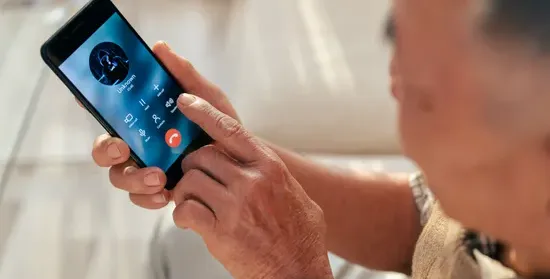
Watch out! "Grandparent Scam" is targeting your family.
Grandparent scams are a common form of financial fraud that targets unsuspecting seniors. These scams typically involve con artists who pose as grandchildren or other relatives in order to gain access to money or personal information from their victims.
These scammers often use a variety of different tactics and strategies in order to convince their victims that they are actually talking to a close relative, including using convincing stories, emotional appeals, and even creating fake websites or social media profiles.
Older people most simply have a good heart. They find it hard to believe that someone would hurt them. And yet, the truth is cruel. That's why this type of fraud scares and disgusts people even more. Let's do everything we can to curb the actions of fraudsters.
How the scam works?

Fraudsters often use telephone directories from which they select people with names that are common among older people, then call the telephone number they have selected. The call is made in such a way that the person being scammed believes they are talking to a member of their family and mentions their name and other details themselves, allowing the criminals to steer the conversation credibly. Those details are usually taken from social media sites.
Fraudsters usually impersonate close family members and ask for a discreet loan. However, they "cannot" collect it in person, so they send a "friend" or ask them to wire money to a designated account number. But there are many more mechanisms for fraudsters to operate.
Most often, contact begins with a telephone call. The caller claims to be an old friend of family member. If the senior may know the person, they often say they are in a crowded place, are ill, have had a dental procedure, anything to lull alertness and give a hint of a change in voice.
Then the grandchild's name is dropped, two nice sentences about him or her to let them know they definitely know each other, and then they get to the point of building tension. They inform that something bad has happened e.g. an accident and the grandchild urgently needs money. He has to pay a large amount of money to avoid criminal liability. That he is in a crisis situation and therefore cannot call himself. It can be made clear that he has got into trouble and asks not to inform his parents, that he only trusts his grandparents and knows they will help him. This is typical playing on emotions.
Although there is a lot of talk about these scams among senior citizens, there are still many people who fall for them. The main reason for this is that the callers are very knowledgeable, trusting and have a lot of information about the family.
When the person being scammed has doubts about the identity of the caller, the scammers very often use emotional blackmail: they cry, beg for help or pretend to be tortured after an alleged kidnapping.
What is next?
Cash and valuables are handed over at the place of residence of the person being conned, either on the street or in bank establishments. Sometimes they come for their victims by taxi, they travel together to, for example, a bank in order to make a transfer and withdraw cash. Fraudsters tell elderly people not to tell anything to the bank branch staff when they go to the bank to withdraw money.
Fraudsters make a large number of telephone calls to their victims, at short intervals, in order to exert psychological pressure and persuade them to transfer money quickly. The purpose of these frequent phone calls is also to make it difficult for the person being scammed to get in touch with family members supposedly asking for financial help.
Such scams are easy to verify, but in a situation like this, the senior citizen thinks of nothing else but helping their loved ones. One phone call to children or grandchildren would be enough. But there is no time for that. The scammer informs them that he will be there in a moment to collect the money. He comes dressed in a hoodie, in the dark, there is no chance of recognising him.
As public awareness of fraud grows, they are trying new techniques. One of these is to pretend to be a government official or police officer. It is also common for the scammer to be followed by a phone call from a police officer, or rather another person claiming to be one. He informs them that the fraudster called earlier asking for money, that they know about it, that the man is being followed and they just want to catch him. They therefore ask that when he comes to collect the money don't ask for anything, give the bag and they will catch him. Of course, this is another trick to calm your vigilance. Everything will happen very quickly, so that you won't have time to think whether to call your family or the police.
Do scammers only contact you by phone?

Of course not. Telephone contact is of course the quickest and safest method of contact, as you can't see the thief, but it's also the riskiest for them, as it raises a lot of questions and the scam can fail.
Very often lately, this type of contact is made via WhatsApp - this is a very popular application among seniors. They exchange various messages and videos there. Scammers take advantage of this. They send grandchildren's pictures they have found on Facebook, for example, in order to increase the credibility of the situation. Whatever channel of communication they use, always be vigilant.
It would seem that such scams only happen online or by telephone. Nothing could be further from the truth. There are also scams where the thief comes to your home! He claims to be a friend of your grandson or a police officer. He is very nice, but his aim is to rob you. If you don't have cash at home they may ask for your card and PIN! and offer to withdraw the money themselves or make a transfer via Western Union on your behalf.
Or it could be the other way round: if you go into the other room, they rob you of valuables and money. Remember, if you are home alone, never let anyone into your house. No matter who it should be. Fraudsters pretend to be absolutely anyone. If you are not expecting someone to read your meter, for example, call the company and ask if they have sent someone. Treat every person with the same suspicion. If it turns out to be a genuine employee or official, it's better to apologise than to lose a lifetime's possessions.
How do I avoid being scammed?

- Treat every person who contacts you as a potential scammer. As sad as it sounds, you need to be aware that scammers have no scruples - they scam the elderly, the sick, the poor and unfortunately you need to be vigilant.
- If ever a person tries to contact you claiming to be a grandchild remind yourself of this article. Above all, stay calm, lock the door and call your family and the police immediately to inform them of the incident.
- Never, under any circumstances, give or send money to anyone. Even if someone is claiming to be a police officer or official. Even more so, they would never ask you for sending cash or jewellery.
- Talk to your neighbours and friends. Inform them that such scammers are out there. Let as many people as possible know about it and share the information further.
- Talk to your grandchildren about this potential situation, and agree that they will never ask for anything like this. If they are in need, think on another way of communication and verification, especially if they live in a foreign country. You may even establish some common sign or password known only to you.
- Never give anyone information about your family, the money you have, where it is. Don't share information, e.g. on a bus where other people can hear it.
- Don't believe anyone, even if they give details about your family. People now share a lot of information online and that's how they can know. Not necessarily from your grandchild.
- If someone calls you in the middle of the night, try to knock them off guard by asking them uncomfortable questions. Ask for information that only a real person who knows your grandchildren will know.
- Don't talk to random people about your finances.
- Don't keep a lot of cash at home, put it all in the bank. Contact them to choose the best account for you.
- For verification purposes, never call the number provided by the caller. Use numbers you know. If you don't know what to do call 101.
Summary

If you do suspect that you may have fallen victim to a grandparent scam, report it immediately to the authorities so that they can take action against these criminals and help protect others from being scammed as well. Stay vigilant, stay informed, and watch out for those grandparent scams! They are all too common in today's world, but with careful vigilance you can avoid becoming another victim.
So if you ever receive a call from someone claiming to be your relative asking for money or sensitive information, remember that it could very well be a scammer trying to trick you into giving up your hard-earned cash or private data. Be skeptical and always verify before taking any action, and you will be able to protect yourself from these dangerous scammers.
Police make an appeal, especially to young people - let's inform our parents and grandparents that there are people who may try to take advantage of their kindness. Let's tell them how to behave when someone calls them asking to borrow a large amount of money.
All persons who come into contact with the elderly, especially lonely persons, are asked to be cautious in their contact, to identify themselves, not to put them under unnecessary stress, to inform them in advance of checks planned in the area, meter lists, etc.
People working in banks are also trained for such situations, especially if the older person is in the company of others or withdrawing or transferring a large sum of money. They are vigilant and ask questions, checking whether it is a scam.
Do not be offended if older people are suspicious and ask questions. This is what we want to teach them, that they have to do so in order not to be robbed of their life's possessions this one time. We all know that there have been many such situations, and although it seems that everything has already been said, the next person gives money to the thief as if nothing ever happened. We all need to spread awareness about the "grandparent scam".